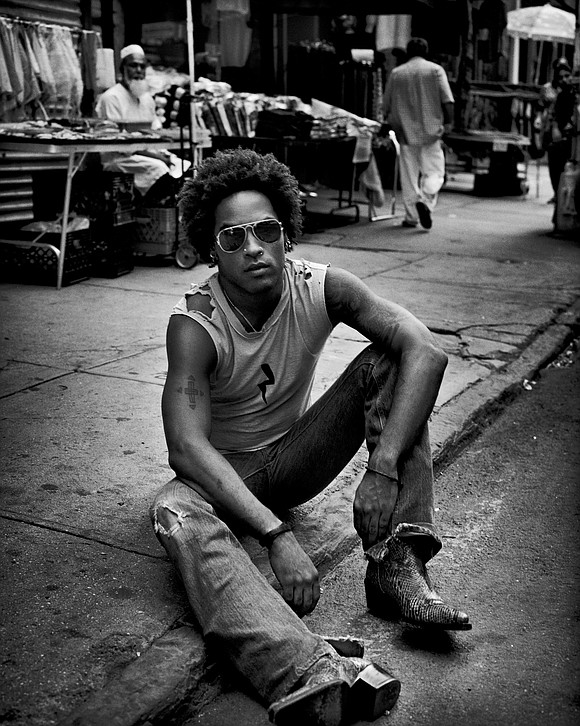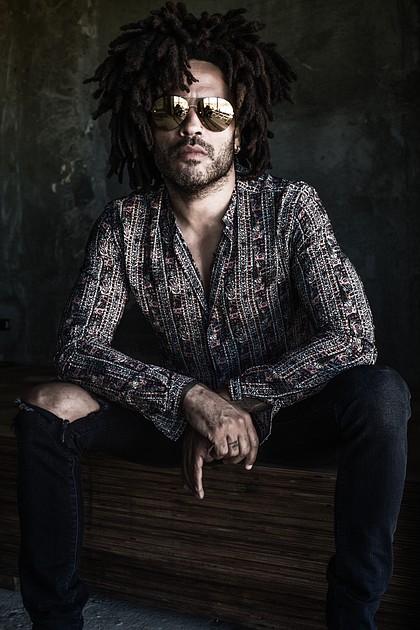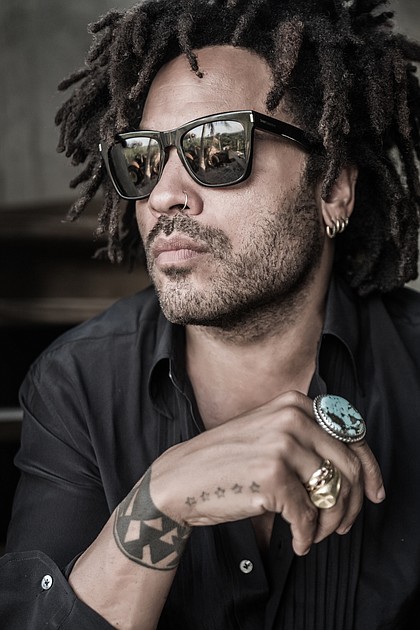Lenny Kravitz on Race, God & Spreading Love Through Music
Allison Kugel | 6/15/2018, 10:27 a.m.
Twenty-nine years after releasing his debut album, Lenny Kravitz is still letting love rule, but with an eye towards societal strife that continues to go unchecked. The multi-Grammy award winning musician brings forth a conscious body of work with Raise Vibration, his eleventh studio album, out September 7th. The first single off the Raise Vibration album, It’s Enough, is a battle cry against corporate greed, political corruption, and racism. Kravitz switches gears with his follow up single, Low, exploring the perils of his near-mythical sensuality with intonations alluding to his past intimate relationships. For Lenny Kravitz, the art of the story is paramount, while pop music trends are immaterial. He tells stories through his writing, vocals, and the multitude of instruments he has mastered over the years.
Musically, Raise Vibration is an eclectic blend of the kind of stylistic rock n’ roll-funk sound that Kravitz is known for, with subtle nods to vintage R&B and choruses that sway towards pop appeal. His music puts you in a trance-like groove and defies all genre.
Lenny Kravitz, the man, is a veritable roadmap of his past experiences. From making his way in an industry that doesn’t always value individuality, to making his way in a world that begged to define and categorize him by race and ethnicity in his formative years, he wears his memories on his sleeve and they inform much of his artistic expression. Our conversation surprised me as it took a more intimate turn. He and I delved into matters of spirituality, racial identity, family and the rituals that aide him in creating his eclectic sound. We were very much on the same page as he shared his feelings about everything from racism and societal injustice to his personal spiritual journey, his family, and his music.
Allison Kugel: You’ve said you were born to make music. Can you share your earliest memory where you became aware that music was going to be your life?
Lenny Kravitz: For me, the pivotal moment was going to see The Jackson 5, live at Madison Square Garden, when I was six years old. I was in the first grade. I had already been intently listening to their record. But I went to the show, and the next morning that was it! I was completely sold. I knew that’s what I wanted to do.
Allison Kugel: What was it about The Jackson 5 that resonated with you?
Lenny Kravitz: Number one was the music. The music was incredible. The music that was made by these kids was not elementary, it wasn’t bubble gum as they used to say back then about young artists. This was very sophisticated, high-level music with the best musicians, the best producers, and [Michael] was one of the best singers who ever lived and who ever will live. The level of interpretation and feeling and vocal range… it was a perfect storm for me, the way everything came together. On top of the music, the presentation and the showmanship were top level and soulful, and these were people that I could identify with. They looked like me. I had the same hair… there were so many things that came together in my mind.
Allison Kugel: It’s interesting to hear you say that. My son is half Jewish and half Jamaican, and he does the same thing. He tends to gravitate towards people he sees on television, in film, and with music, who have his skin tone and his hair.
Lenny Kravitz: Yup! I have the same background, except I’m Jewish and Bahamian.
Allison Kugel: When and where do you feel most creative and musical?
Lenny Kravitz: It could be anywhere, but it’s in the studio, so wherever that may be. My studio is in the Bahamas. It’s my favorite place to work; it’s my workshop. When I’m in the studio and I’ve got all my equipment and all my instruments, and everything is set up, that’s the magical place for me. It’s where I’m comfortable and where I can flow. When I’m inspired and in that flow, I can move. I jump around from instrument to instrument, and it’s wonderful.
Allison Kugel: You are such a true musician in every sense of the word. Aside from singing, you play several instruments, and you write and produce. When you record your music, is it all you doing everything in the studio? Are you recording all of the instrumentals in addition to doing your vocals and producing?
Lenny Kravitz: Yes, I start on drums normally and then I go to a guitar, a bass, another guitar, keyboard, percussion… I keep layering as though I was painting, until my picture is complete.
Allison Kugel: Your upcoming album is called Raise Vibration and the first single, It’s Enough, is a call-to-action anthem about political corruption and social and racial injustice. Was writing It’s Enough a form of therapy for you, and a way of turning hopelessness into empowerment? For example, I live part of the year in Florida, not too far from Parkland. When the Parkland school shooting happened, I went into a depression where I was feeling helpless as a parent. Then I thought, “I’m a writer. I can contribute something by writing a piece about this.” Was it a similar process for you?
Lenny Kravitz: I react to the world. Just as you say you did, I have a reaction. I actually recorded the song twice. I was trying to find the direction for the record. The way the song started, the first version of It’s Enough was a full-on guitar, bass, drum, punk rock song. It had an angry tone to it, because that felt like the proper reaction. And then I thought about it and ended up changing it and finding this groove, which is the polar opposite of what it started out as. I found that by being calm and by being centered and by being quiet, it was more effective. It brought out a whole new feeling in the song, and I think it enables the listener to hear the lyrics even better.
Allison Kugel: And you feel it brings more of a positive energy, as opposed to the original version, which would have brought forth anger.
Lenny Kravitz: Absolutely. I’m all about positive energy. I’m stating the facts, but in the end, I always take an optimistic and positive tone that, “People, we can do this!” We can do it. It’s just a matter of waking up.
Allison Kugel: What does the title of your album, Raise Vibration, mean to you? And how do you raise your vibration? Do you meditate? Do you Pray?
Lenny Kravitz: It means exactly that; waking up. I meditate, I pray, I try to be still, I try to be quiet… and listen. It means having the desire to learn, to improve, and to face my faults and learn from them. I’m always looking to go higher. And taking as much ego out of myself as possible.
Allison Kugel: How do you define God?
Lenny Kravitz: I believe that God is my creator, our creator. Whether we realize it or not, I believe we are all created by the same God. I believe we are all one creation, we are all connected, and I believe that God is the ultimate source of love and all we are looking for.
Allison Kugel: Do you consider yourself an activist?
Lenny Kravitz: That’s a difficult one. I use my music to express myself, and if it inspires others then that’s a beautiful thing. I don’t know that I’m initially doing it for any other reason than to express myself. But I do see myself going more in that direction where you could call it that.
Allison: I ask because when I listened to It’s Enough, your first single off this new album, I could tell you’re at a point in your life, and in your career, where you have no problem stating your opinions on societal issues.
Lenny Kravitz: Right, but for instance, from my first album, Let Love Rule up until now, I haven’t had that problem. It’s always been within me to express myself truthfully.
Allison Kugel: I always say that when I enter a room, or wherever I may be, that I never walk alone because I can feel the presence of God beside me, as well as my great grandparents, my grandparents, my parents, siblings and my son. I walk into a space with the energy of those who made me who I am, walking beside me. When you enter a space, who walks beside you?
Lenny Kravitz: God is with me at all times which I am always aware of. And the energy of my mother, of my grandmother, of my grandfather. My daughter (actress, Zoe Kravitz), who is here with me on this earth, is always with me. And like you said, knowing that and feeling that, and knowing that spirit is far superior to anything here. The physical presence is wonderful, and something that we require and crave as human beings. We’re spiritual beings living a physical experience, but as you say, you recognize that you have these people with you and it just shows how strong spirit is and how strong energy is. My mother’s (the late actress, Roxie Roker) been gone for twenty plus years, and I can still feel her every day. I can still sense her presence because the energy she left is so powerful. That’s an awesome thing.
Allison Kugel: Your music really transcends any one genre. It’s a blend of rock, punk, blues, soul, pop; it’s really everything. You can’t categorize your music. And I remember seeing a clip of you, I believe it was on Oprah’s Master Class, where you tell the story of sitting in a classroom as a young boy and you didn’t know which box to check off on a piece of paper asking you to identify your race. Everyone’s life has a theme, and that theme repeats itself over and over again because it’s tied to something we’re supposed to learn while we’re here. In your case it seems to be this ongoing theme where people want to put you in a box and label you, and you railing against that.
Lenny Kravitz: People love a box (laughs)! And they want to put you right in it, so they can easily define, for their own comfort, what you are. I’ve been fighting against that from day one in my life, and in my musical life. Like with radio stations, this one only plays this, and that one only plays that. This fits here, and that fits there, and you don’t fit here. It’s like, “Shit! That’s not what art is about!” But, unfortunately, that’s not what the business is, which is very frustrating. Going back to that time in school, I knew I was black, but I knew that wasn’t all I was. I knew I was also Russian Jewish and I knew that my great grandmother was full blooded Cherokee Indian. My mother always taught me, “Yes, you’re black, but you’re just as much this and you’re just as much that, and you don’t discount that.” If you’re mixed, like me and like your son, you don’t discount one of your parents. You’re just as much one as the other. But, what my mother did say to me when I was a child that I think was very smart, and I didn’t realize it until I got older, was, “Even though you’re mixed, society only wants to see you as black.” I didn’t understand that at age seven.
Allison Kugel: Did you feel diminished by it, at that time, at age seven?
Lenny Kravitz: I remember her saying it, but I don’t remember exactly how I felt when she said it. From what I recall, I remember thinking, “What does that mean?” Of course, as I grew and went through life, I understood what that meant. People aren’t going to see all the complexities and the differences. People are going to see what they see, and that is the color of your skin. Not all people, but a lot of people. That was a very good lesson once it kicked in. I was like, “Okay, people don’t see everything for what it is.” People see what they want to see. They judge it how they want to judge it, based upon their pre-conceived ideas of what that is.
Allison Kugel: It’s a tough conversation to have with a child.
Lenny Kravitz: But kids know from what I see are not tripping on the race thing like generations before, are they?
Allison Kugel: There is a difference from generations ago, and my son has several multiracial friends. Recently, he said, “Mom, what does black mean? My skin is brown.” Part of my response in explaining it was that “black” is a political term and a societal designation, as is “white.” Of course, that will also make more sense as he gets older.
Lenny Kravitz: You have to explain to kids people’s fucked up attitudes about race. That’s really what you’re doing. You have to break down the judgment and short sightedness, and peoples’ hang ups, and the history of people screwing over other people because they were different.
Allison Kugel: Speaking of kids, how would your daughter Zoe describe you, both as a man and as an artist?
Lenny Kravitz: Oh wow! We’re very, very close. I think she would say that I have respect and integrity, and love in my heart. I think as a musician, she respects what I do. She’s grown up around it. She grew up seeing it her whole life. This is hard because If I say, “She thinks I’m amazing,” then it sounds like I’m complimenting myself. She respects the craft, what it takes and what I put into it, which is everything.
Allison Kugel: On September 7th, the day the new album, Raise Vibration, is released, what are those days like for you, when a new album drops?
Lenny Kravitz: When I’m finished with an album, I’m at that place where I let go and I’m excited that I’m finished. It’s always exciting getting a new project out. I hope the people who enjoy my music will get something beautiful from it and will relate to it. As far as the rest, in terms of how well it does, sales and all of that, that’s all great, but the main thing for me is that I expressed myself authentically to who I am, who I was at that moment in time, and that it represents me well. That to me is everything. That’s a success.
Photo Credits: Mathieu Bitton, Mark Seliger
3X Platinum Lenny Kravitz GREATEST HITS album is now available on vinyl as a 2 LP set via Virgin/Ume at uDiscoverMusic. His 11th studio album Raise Vibration is set for release September 7th via BMG. Pre-order at LennyKravitz.com. The album’s debut track, It’s Enough, is available to stream at iTunes.
Allison Kugel is a syndicated entertainment and pop culture journalist, and author of the book, Journaling Fame: A memoir of a life unhinged and on the record. Follow her on Instagram @theallisonkugel and visit AllisonKugel.com.






